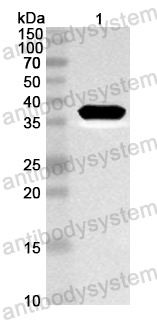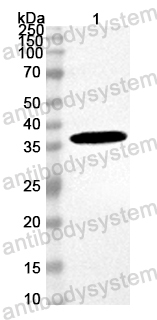Catalog No.
PME54201
Species reactivity
Mouse
Host species
Rabbit
Isotype
IgG
Clonality
Polyclonal
Immunogen
E. coli - derived recombinant Mouse XCL1/Lymphotactin (Ser30-Gly114).
Tested applications
ELISA: 1:4000-1:8000, IHC: 1:50-1:100, WB: 1:1000-1:4000
Target
Lymphotactin, C motif chemokine 1, Cytokine SCM-1, Lymphotaxin, Small-inducible cytokine C1, Xcl1, Lptn, Ltn, Scyc1
Purification
Purified by antigen affinity column.
Accession
P47993
Applications
ELISA, IHC, WB
Form
Liquid
Storage buffer
0.01M PBS, pH 7.4, 50% Glycerol, 0.05% Proclin 300.
Stability and Storage
Use a manual defrost freezer and avoid repeated freeze thaw cycles. Store at 2 to 8°C for frequent use. Store at -20 to -80°C for twelve months from the date of receipt.
IL-11/IL-11R signal inhibition by 9MW3811 remodels immune tumor microenvironment and enhances anti-tumor efficacy of PD-1 blockade., PMID:40355638
IL-18-primed NK cells recruit dendritic cells and potentiate tumor therapy mediated by PD-1 blockade., PMID:40165899
The XCL1/XCR1 axis is upregulated in type 1 diabetes and aggravates its pathogenesis., PMID:40014407
Neutralizing IL-38 activates γδ T cell-dependent antitumor immunity and sensitizes for chemotherapy., PMID:39209451
Chemokines and Cytokines in Immunotherapy of Melanoma and Other Tumors: From Biomarkers to Therapeutic Targets., PMID:38928238
The chemokine XCL1 functions as a pregnancy hormone to program offspring innate anxiety., PMID:38428650
The XCL1-Mediated DNA Vaccine Targeting Type 1 Conventional Dendritic Cells Combined with Gemcitabine and Anti-PD1 Antibody Induces Potent Antitumor Immunity in a Mouse Lung Cancer Model., PMID:38339158
A candidate nanoparticle vaccine comprised of multiple epitopes of the African swine fever virus elicits a robust immune response., PMID:37964304
Targeting Members of the Chemokine Family as a Novel Approach to Treating Neuropathic Pain., PMID:37570736
Lymphocyte-Related Immunomodulatory Therapy with Siponimod (BAF-312) Improves Outcomes in Mice with Acute Intracerebral Hemorrhage., PMID:37191423
New insights into the analgesic properties of the XCL1/XCR1 and XCL1/ITGA9 axes modulation under neuropathic pain conditions - evidence from animal studies., PMID:36618360
Immunogenicity of the Xcl1-SARS-CoV-2 Spike Fusion DNA Vaccine for COVID-19., PMID:35335039
Targeting Xcr1 on Dendritic Cells Rapidly Induce Th1-Associated Immune Responses That Contribute to Protection Against Influenza Infection., PMID:35296089
Transcriptional regulation of chemokine network by biologic monotherapy in ileum of patients with Crohn's disease., PMID:35078095
Intranasal delivery of a cDC1 targeted influenza vaccine with poly(I:C) enhances T cell responses and protects against influenza infection., PMID:34923667
Development of novel reagents to chicken FLT3, XCR1 and CSF2R for the identification and characterization of avian conventional dendritic cells., PMID:34767637
XCR1+ type 1 conventional dendritic cells drive liver pathology in non-alcoholic steatohepatitis., PMID:34017133
Blockade of XCL1/Lymphotactin Ameliorates Severity of Periprosthetic Osteolysis Triggered by Polyethylene-Particles., PMID:32849609
γδ T Cell-Secreted XCL1 Mediates Anti-CD3-Induced Oral Tolerance., PMID:31578268
Endocytosis Deficient Murine Xcl1-Fusion Vaccine Enhances Protective Antibody Responses in Mice., PMID:31156636
Dendritic cell targeted Ccl3- and Xcl1-fusion DNA vaccines differ in induced immune responses and optimal delivery site., PMID:30755656
The Magnitude and IgG Subclass of Antibodies Elicited by Targeted DNA Vaccines Are Influenced by Specificity for APC Surface Molecules., PMID:31022690
Molecular vaccine prepared by fusion of XCL1 to the multi-epitope protein of foot-and-mouth disease virus enhances the specific humoural immune response in cattle., PMID:28929328
The anti-influenza M2e antibody response is promoted by XCR1 targeting in pig skin., PMID:28794452
Mechanistic Sharing Between NK Cells in ABMR and Effector T Cells in TCMR., PMID:28654216
Identification and expression analysis of three XCR1-like receptors from Epinephelus coioides after Cryptocaryon irritans infection., PMID:28587832
A Novel α9 Integrin Ligand, XCL1/Lymphotactin, Is Involved in the Development of Murine Models of Autoimmune Diseases., PMID:28550205
Targeting Influenza Virus Hemagglutinin to Xcr1+ Dendritic Cells in the Absence of Receptor-Mediated Endocytosis Enhances Protective Antibody Responses., PMID:28228559
CD8+ T Cells Orchestrate pDC-XCR1+ Dendritic Cell Spatial and Functional Cooperativity to Optimize Priming., PMID:28190711
Evidence for CD16a-Mediated NK Cell Stimulation in Antibody-Mediated Kidney Transplant Rejection., PMID:27906829
Anti-apoptotic Effects of Human Wharton's Jelly-derived Mesenchymal Stem Cells on Skeletal Muscle Cells Mediated via Secretion of XCL1., PMID:27434589
Microglial Inhibition Influences XCL1/XCR1 Expression and Causes Analgesic Effects in a Mouse Model of Diabetic Neuropathy., PMID:27387353
Expanding the tools for identifying mononuclear phagocyte subsets in swine: Reagents to porcine CD11c and XCR1., PMID:27345169
Identification and characterization of a novel intelectin in the digestive tract of Xenopus laevis., PMID:26855011
Induction of potent CD8 T cell cytotoxicity by specific targeting of antigen to cross-presenting dendritic cells in vivo via murine or human XCR1., PMID:25520399
Genes associated with antibody-dependent cell activation are overexpressed in renal biopsies from patients with antibody-mediated rejection., PMID:25449536
Vaccine molecules targeting Xcr1 on cross-presenting DCs induce protective CD8+ T-cell responses against influenza virus., PMID:25410055
Bacterial lipopolysaccharides stimulate production of XCL1, a calcium-dependent lipopolysaccharide-binding serum lectin, in Xenopus laevis., PMID:23454582
CCL2 and CCL3 are essential mediators of pelvic pain in experimental autoimmune prostatitis., PMID:22814670
[Biological activity of purificated swine XCL1 protein and preparation of its polyclonal antibody]., PMID:22152819
Aire-dependent production of XCL1 mediates medullary accumulation of thymic dendritic cells and contributes to regulatory T cell development., PMID:21300913
Chemokine profile of synovial fluid from normal, osteoarthritis and rheumatoid arthritis patients: CCL25, CXCL10 and XCL1 recruit human subchondral mesenchymal progenitor cells., PMID:20709179
Chemokine profile of human serum from whole blood: migratory effects of CXCL-10 and CXCL-11 on human mesenchymal stem cells., PMID:20001843
I-TAC is a dominant chemokine in controlling skin intragraft inflammation via recruiting CXCR3+ cells into the graft., PMID:19875106
Regulatory T cell dysfunction in subjects with common variable immunodeficiency complicated by autoimmune disease., PMID:19162554
XCL1 (lymphotactin) chemokine produced by activated CD8 T cells during the chronic stage of infection with Mycobacterium tuberculosis negatively affects production of IFN-gamma by CD4 T cells and participates in granuloma stability., PMID:17699612
Single-cell analysis of the murine chemokines MIP-1alpha, MIP-1beta, RANTES and ATAC/lymphotactin by flow cytometry., PMID:12609535
Cytokine-chemokine networks in experimental mycobacterial and schistosomal pulmonary granuloma formation., PMID:12600821
Local and systemic effects of an allogeneic tumor cell vaccine combining transgenic human lymphotactin with interleukin-2 in patients with advanced or refractory neuroblastoma., PMID:12406881
Adenovirus-mediated intratumoral lymphotactin gene transfer potentiates the antibody-targeted superantigen therapy of cancer., PMID:12226740


